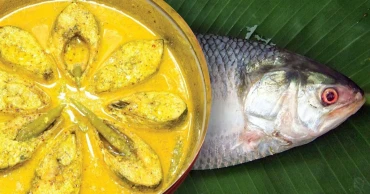Hilsa ban
Hilsa returns to Khulna markets after 22-day ban
After a 22-day government-imposed fishing ban, hilsa (ilish) has made its return to markets in Khulna, though supplies remain limited and prices high.
The ban, aimed at protecting mother hilsa and ensuring sustainable production, ended on October 25, after which fishermen resumed fishing and Khulna’s markets began receiving limited supplies, driving prices up.
On Sunday, modest quantities of hilsa arrived at several wholesale markets across the city, including Rupsa, Moylapota, Nirala, New Market, Khalishpur Chitrali, Daulatpur, Fulbari Gate, Shiromoni and Fultala.
Retailers reported that hilsa weighing around one kilogram was selling for Tk 3,000–3,200, while those weighing 700–900 grams were priced at Tk 1,800–2,000. Smaller hilsa, known as jakta, were selling for Tk 900–1,000 per kg.
Hilsa fishing ban ends: Fishermen in Chandpur set to return to rivers
Footfall remained low on the first day, largely due to high prices and limited availability. Retailers expect prices to stabilise once fishing activity increases and supply improves.
“Fishermen only resumed fishing on October 25. Once more hilsa are caught and transported, prices are expected to come down,” said a retailer at Rupsa market.
Sharing the hardship faced by fishermen during the ban, Hamidur Rahman, a local fisher, said the month-long halt had been very difficult, but they were now back at sea with hopes of a good catch.
Md Jahangir Alam, Khulna divisional director of the Department of Fisheries, said the ban had been strictly enforced across all four districts of the division to protect mother hilsa during the main breeding season.
Authorities remain optimistic that this year’s hilsa production will surpass that of last year, he added.
4 months ago
Delicious hilsa slips from table to luxury list
Once a weekly staple, the prized national fish hilsa has now become a luxury for many, with its price surging by nearly 50 percent over the past year amid rising market costs.
A recent survey by the Bangladesh Trade and Tariff Commission (BTTC) revealed that between August and September alone, hilsa prices surged by Tk 200–500 per kg, with large specimens sometimes fetching an astonishing Tk 1,000 increase.
Last August, a 1.5 kg hilsa sold for a maximum of Tk 2,000 per kg; by 2025, the same fish now commands Tk 3,000, reflecting a sharp 50 percent spike in just twelve months.
22-day hilsa fishing ban to begin Friday midnight
A stroll through Dhaka’s bustling kitchen markets paints a stark picture: river fish are almost vanishing from the shelves, a consequence of the government’s ongoing fishing ban designed to preserve the species.
Locally caught fish such as ‘rui’, ‘katla’, ‘koi’ and ‘shing’ have filled the gap, but at significantly higher prices.
For shoppers, the joy of seeing hilsa in the market is often tempered by sticker shock.
“Just before the ban, buyers rush to stock hilsa, and that automatically pushes up the price,” explained Enamul, a fish trader at Shantinagar kitchen market.
Another vendor at Karwan Bazar pointed out that wholesale price has surged, forcing retailers to raise rates, even though supply has not been disrupted.
Hilsa catching, sales banned for 22 days from Oct 4
For consumers, however, the once-affordable fish has become almost unattainable.
“A decade ago, big hilsa were sold in pairs for under Tk 2,000. Now, buying just one costs at least Tk 5,000,” lamented Mohibur Rahman.
Shoppers like Arif Hossain also voice frustration at the paradox of the fishing ban.
“Fishing, transportation, and marketing of hilsa are banned for 22 days every year. The government says it helps increase production. If production rises, prices should logically go down — but that never happens. In fact, hilsa prices skyrocket during the first week after the ban is lifted,” he said.
Middle-class families, who once relished the aroma of freshly fried hilsa on weekend afternoons, now have to compromise.
“Hilsa is our national fish, and its price should be affordable for everyone. But it’s being sold at exorbitant rates. For middle-class families, buying hilsa has become a luxury,” said Shagufta Akter Lipi.
Many households have resorted to cheaper alternatives to meet their protein needs.
Yet despite the soaring prices, the real beneficiaries—fishermen—see little gain. In Bhola, the country’s largest hilsa-producing district, most fishermen rely on leased boats and advance loans from wholesalers, locally known as dadon. They are often compelled to sell their catch at fixed rates, leaving minimal profit.
Hilsa floods Chandpur markets, prices drop
“Our share is tiny. After repaying the dadon money, nothing much remains,” said veteran fisherman Khalek Majhi.
The BTTC study highlights the convoluted journey of hilsa from river to table. Typically, the fish changes hands five times—fishermen, landing stations, wholesalers, commission agents, retailers and finally, buyers.
While fishermen might earn only Tk 800 per kg for large hilsa, the same fish reaches Dhaka markets at Tk 3,000, reflecting a huge markup driven by multiple intermediaries.
The study breaks down the costs further: fishing expenses range from Tk 470–500 per kg, resale margins often add Tk 1,000, and additional costs include Tk 75 for wholesale-to-retail transfers, Tk 150 from retail to consumer, and commissions exceeding 10 percent in some cases.
Syndicate practices, including cold storage stockpiling, further fuel price spikes.
“Hilsa prices naturally rise by over 60-70 percent just due to multiple handovers, and syndicate manipulation makes it worse,” noted Sabbir Hossain Khan, an agricultural economist and PhD researcher at Tokyo University of Agriculture.
To tame these soaring prices and ensure fair returns for fishermen, the BTTC has recommended reducing the number of middlemen.
Proposals include empowering fishermen’s cooperatives or establishing government marketing outlets to supply hilsa directly during peak season, offering hope that the nation’s cherished fish could one day grace the dinner table without burning holes in pockets.
4 months ago
Hilsa returns to Chandpur markets after ban; prices fall, buyers rejoice
After a two-month ban that kept nets dry and hopes high, the beloved hilsa has returned to Chandpur’s markets, rekindling excitement among fishermen and food lovers alike.
The renewed supply has led to a noticeable fall in prices, bringing relief to fish lovers and low-income families.
A recent visit to Chandpur’s main fish landing station, known as the Chandpur Fish Landing Centre or ‘Boro Station Macch Ghat’, showed a marked rise in activity.
Around 50 maunds of hilsa are now being brought in daily.
Coolies like Fazal and Almas were seen working nonstop to handle the increasing volume.
Senior fish traders, including Nurul Islam, Didar Khan and Shajahan Sardar, said hilsa from southern coastal areas such as Hatiya, Bhola, Sandwip and Charfesson have started arriving by pickup vans in recent days. Daily deliveries are now from 40 to 50 maunds.
Fishing trawlers, which usually bring in 150–200 maunds at a time, have not yet resumed operations following the end of the ban. Even so, the growing supply from pickup vans over the past three days has helped stabilise the market and drive down retail prices.
This decline is visible across Chandpur’s key markets—Natun Bazar, Pal Bazar, Wireless Bazar, Puran Bazar and Baburhat.
Just a few weeks ago, a one-kilogram hilsa was priced at Tk 3,000.
Now it is selling for around Tk 2,500. Medium-sized fish weighing 700–800 grams are currently priced at Tk 1,700–1,800 per kilogramme, down from Tk 2,300.
Sylhet sees surplus of sacrificial animals ahead of Eid-ul-Azha
Smaller hilsa in the 300–400 gram range, sold in groups of three to make a kilo, are now available for Tk 1,000–1,100.
At Biponi Bagh, Chandpur’s busiest fish market, the same trend is clear. One-kilogramme Padma hilsa are retailing at Tk 2,200–2,500, down from Tk 3,000–3,200. Fish weighing 600–700 grams are selling at Tk 1,500–1,550 per kilogramme, compared to earlier rates of Tk 2,200–2,300.
Shoppers, many with smiles on their faces, were seen leaving markets with prized fish in hand.
Traders said hilsa from the southern coastal districts are more affordable than those from the Padma River.
One-kilogramme coastal hilsa is now priced at Tk 1,700–1,800. Smaller varieties are going for Tk 800–900 per kilogramme.
Still, many buyers said these lack the distinctive taste and aroma associated with Padma hilsa.
Fisheries officials, including Miznur Rahman and Mahbub-e-Rashid, sounded optimistic about what lies ahead. “July through September will see abundant catches,” said one official.
Hilsa traders and fishermen shared the same outlook. Shabebarat Sarkar, a trader with over 40 years of experience and president of a local fish traders’ association, said the volume of river hilsa will rise sharply once the monsoon sets in. Sea fishing remains under a separate ban.
“With increased rainfall in June and July, water levels and river currents will rise—conditions that are ideal for hilsa migration,” he said.
“We expect larger catches and even lower prices in the coming weeks," he added.
Meghna’s Toxic Turn: Mass fish deaths spark alarm among fisherfolk
As hilsa returns in greater numbers and prices ease, Chandpur’s markets are once again buzzing, with the energy of fish trading and the cheer of happy customers.
9 months ago
26 fishermen detained for defying hilsa ban in Chandpur
In a crackdown on illegal fishing during the hilsa breeding season, a mobile court detained 26 fishermen in the Padma-Meghna sanctuary area of Chandpur over the past 24 hours for violating a government ban.
The operation was led by Chandpur Sadar Upazila Executive Officer (UNO) Shakhawat Jamil Saikat and involved collaboration among the river police, coast guard, and fisheries department.
This detention is part of the "Mother Hilsa Conservation Campaign-2024," aimed at protecting the species during its peak breeding period.
Mobile court sentences 4 for catching Hilsha in defiance of ban
Authorities also seized 50 kilogrammes of hilsa, 10,000 metres of illegal fishing nets known as "current nets," and a fishing boat.
Of those detained, 17 fishermen were sentenced to one month in prison without labor. The remaining nine, who were minors, were released issuing a warning and signing written bonds.
"Our efforts are aimed at safeguarding hilsa breeding and ensuring compliance with the law," said UNO Shakhawat.
The seized hilsa fish were distributed to local orphanages, and the illegal nets were burned at the Chandpur Coast Guard Station to prevent further use.
165 fishermen jailed for defying hilsha ban
The government has imposed a 22-day fishing ban from October 13 to October 22 along a 70-kilometer stretch of the Padma-Meghna rivers in Chandpur to ensure the safe spawning of hilsa.
During this period, catching, selling, storing, and transporting hilsa or any other fish is strictly prohibited. Violators may face fines of up to Tk 5,000, a maximum of two years in prison, or both.
1 year ago
Hilsa prices hit record high in Chandpur ahead of 22-day fishing ban
Prices of hilsa have shot up again in Chandpur markets as a 22-day ban on hilsa fishing is set to begin at midnight on Saturday, to ensure safe spawning in the freshwaters of the Padma and Meghna rivers.
The ban has sparked a rush at Chandpur’s Boro Station fish ghat, one of the country’s largest fish landing centers, where buyers have been scrambling to purchase the priced fish before the restriction takes effect.
The government ban, aimed at protecting hilsa during its spawning season, will remain in place until November 3.
Traders said hilsa weighing 1 to 1.2 kilograms is being sold for Tk2,800- 3,000 per kilogram, an all-time high. The price of smaller hilsa, weighing 500 to 900 grams, ranges from Tk 1,200 - 2,000 per kilogram.
479 MT hilsa exported to India through Benapole
“Prices were lower just a week ago. Now, even though I want to buy, I can’t because the prices have gone up by Tk500 - 700 per kilogram, said Solaiman, a buyer from Ashikati area.
At the fish landing centre, local fishermen were seen bringing in fresh hilsa, some from nearby areas, while others arrive by truck from Noakhali.
Omar Faruq, manager of the Kalu Bhuiyan fish shop, said “The upcoming 22-day ban is the reason. The number of retail buyers far outnumbers the fish supply here.”
With the ban approaching, some tourists have also flocked to the landing centre, turning their fish-buying trip into a family outing, Faruq adding the market has been busy from morning till night, and on Fridays, many tourists were spotted buying hilsa and having it fried at nearby restaurants.
479 MT hilsa exported to India through Benapole
Veteran fish traders like Nurul Islam and Mostafa Khan said they haven’t seen prices this high in over 50 years. In the city’s busiest markets, including Biponibagh and Palbazar, the story is the same.
Chandpur District Fisheries Officer Golam Mehedi Hasan explained the practice of imposing the ban. "Hilsa migrate from the sea to freshwater during this time to spawn. The 22-day ban covers a 70-kilometer stretch from Shatnol in Matlab Uttar Upazila to Char Bhairabi in Haimchar Upazila."
All fishing, transporting, selling, and stocking of hilsa in this area will be prohibited durning the ban.
Despite increased production—reaching 571,342 tonnes in the fiscal year 2022-23, up from 566,593 tonnes the previous year—the demand for hilsa remains high in Bangladesh, keeping prices elevated in the local market.
In the fiscal year 2023-24, Bangladesh exported 664.86 tonnes of hilsa to India, generating $7.71 million, according to the Department of Fisheries. The previous year saw exports of 1,376.42 tonnes of hilsa, worth $13.68 million.
Read more: 10 Tasty Ilish Recipes for Bangladeshi Kitchen
1 year ago
22-day hilsa fishing ban begins at midnight
A 22-day ban on catching hilsa fishing began across the country on Thursday midnight.
To ensure the safe spawning of the national fish of Bangladesh during its peak breeding period, the government has imposed the ban in the Padma-Meghna sanctuary.
The ban will remain in place till November 2.
Fishermen will not be allowed to catch fish in the Padma-Meghna sanctuary from Shatnal in Matlab Uttar to Char Bhairabi in Haimchar upazila of Chandpur district.
Hilsa price high due to profit-mongers’ greed: Fisheries Minister
Local administration has provided 25 kg of rice to each fisherman during the hilsa fishing ban and distribution of rice has begun in different parts of the district.
The local administrations also held an awareness programme in the coastal areas of the district.
Fishermen were seen passing an idle time and some were seen repairing their nets.
Golam Mehedi Hasan, district fisheries officer, said the rice distribution programme among 43,772 registered fishermen will end within one or two days.
During this period, the taskforce will conduct drives round the clock to check violation of the ban while the mobile court will conduct drives alongside it.
Demand for salted hilsa up in north Bangladesh
He also hoped that the implementation of the programme will play a role in increasing the production of hilsa.
Meanwhile, Chandpur Deputy Commissioner Quamrul Hasan said the taskforce committee will strictly perform their duties and temporary camps will be set up in Matlab North, Sadar and Haimchar upazilas of the district.
22-day ban on hilsa fishing to begin on Oct 12: Fisheries Minister
2 years ago
Chandpur fishermen gear up to catch hilsa as ban ends on Friday midnight
Fishermen are gearing up to resume netting, as the 22-day ban on catching, selling, transportation and hoarding of the delicious hilsa ends on Friday midnight.
Fishermen in different districts, including Chandpur, are preparing their fishing nets and trawlers to head to the rivers after 12am.
Read more: 5 arrested with five maunds of Hilsa in Shariatpur
Like previous years, the ban was imposed on a 90-kilometre-long area from Matlab Shatnol to Haimchar in Chandpur.
The law enforcers seized huge quantities of mother hilsa and fishing nets, trawlers in different parts of the country for catching hilsa defying the ban.
Fisheries department, upazila and district administrations, police and Coast Guard personnel carried out regular drives to make sure that the ban was implemented strictly.
During the ban, around 50,000 fishermen remained unemployed and were allocated 25kg of rice each, which was not enough for them, said local fishers.
Taukir Ahmed, an official from the control room of the district fisheries office, said around 212 fishermen were sent to jail during the ban period in 178 cases.
Besides, 41,855 metres of current nets were seized and destroyed, said head of Chandpur Naval Police Mohammad Kamruzzaman.
The 22-day government ban on hilsa catching, selling, hoarding and transporting came into effect on October 7, with a view to boosting its production.
The ban covered hilsa sanctuaries in six districts -- Barishal, Chandpur, Laxmipur, Bhola, Shariatpur and Patuakhali.
Read more: Hilsa ban: 18 detained in Bhola after fishermen clash with police again
Hilsa, the national fish of Bangladesh, is recognised as a certified patented product of Bangladesh. The marine fish goes to rivers in Bangladesh to lay eggs.
The fish is very popular both in Bangladesh and West Bengal. About 75 per cent of the world's hilsa is netted in Bangladesh.
Chandpur is considered one of the largest trading hubs of hilsa in Bangladesh as the fish from the Padma river is much more popular than the ones that come from other rivers.
3 years ago
Hilsa ban: 18 detained in Bhola after fishermen clash with police again
Four people, including two cops, were injured in a clash that ensued after fishermen allegedly attacked the police in the Padma River in Bhola Saturday.
Police have detained 18 fishermen in connection with the attack so far.
Md Akhtar Hossain, officer-in-charge of Ilisha River Police Station, said being informed they conducted a drive in Char area under the Sadar upazila by a trawler around 5am.
Sensing the presence of the law enforcers, the fishermen, who were netting fish in the river, hurled brickbats targeting the cops when they were chased, he said adding that police retaliated with shotgun rounds, leaving four people including two sub-inspectors injured in the attack.
Read: Cops among 20 injured in attack by fishermen in Barishal
Later, a total of 18 fishermen were detained, 10,000 metres of current net and a fishing trawler were also seized, he said.
A case was filed in this connection, the OC added.
3 years ago
Hilsa export to India: Bangladesh earned $1.36cr this year so far
Bangladesh government has earned 1.36 crore US dollars from exporting 1,352 tonnes of hilsa fish to India this year so far, Fisheries and Livestock Minister SM Rezaul Karim said today.
Hilsa production has doubled in last 12 years and the rate of production is now 90 percent, he said.
The minister revealed this information while speaking at a press briefing on ‘Mother hilsa conservation drive 2022’, held at the Secretariat.
Like every year, the government is going to impose a 22-day ban on hilsa fishing – from October 7 to 28, he said.
Hilsa catching, selling and transporting will remain prohibited in the 7,000 square km area during the period to ensure the safe spawning of the hugely popular fish during its peak breeding period, he added.
“Those found violating the law will face legal action including imprisonment and fine. None will be spared,” said the minister.
Besides, the government will take strict action against those involved in creating any obstruction on the development of hilsa resources.
During this ban period all activities including catching, selling and transportation of hilsa will be prohibited in 20 districts including Chandpur, Laxmipur, Noakhali, Feni, Chattogram, Cox’s Bazar, Barishal, Bhola, Patuakhali, Barguna, Pirojpur, Jhalakathi, Bagerhat, Dhaka, Shariatpur, Madaripur, Faridpur, Rajbari, Manikganj and Munshiganj districts, he said.
The ice factories of the districts will be closed as well during the ban, he added.
Meanwhile, fishermen of 18 districts including Gopalganj, Narayanganj, narsingdi, Kishoreganj, Tangail, Rajshahi, Chapainawabganj, Pabna, Sirajganj, Natore, Bagura, Kurigram, Gaibandha, Brahmanbaria, Khulna, Kushtia, Narail and Jamalpur districts will be allowed to catch other fish except hilsa.
Mobile courts will conduct drives day and night in all rivers of 38 districts, fisheries ghat, wholesale markets, chain shops and other markets to discourage people from catching and selling hilsa fish, he said.
Alongside police, local administration, Navy personnel, Air Force, Coast Guard, Rab, river police and Fisheries Department will jointly conduct the drives.
3 years ago
Coast guards seize 6.38 cr meters nets, 9,832 kgs Hilsa during ban period
Members of Bangladesh Coast Guard seized around 6.38 crore meters of illegal nets, 9,832 kgs of Hilsa and 115 boats from the coastal areas and different rivers during the 22-day ban on Hilsa netting that ended Monday midnight.
The ban was imposed from October 4 to October 25 midnight as part of 'Mother Hilsa Conservation Campaign-2021' to ensure safe spawning of the popular fish during its peak breeding period.
Lt. Khandaker Munif Taki, media officer at the Bangladesh Coast Guard headquarters on Tuesday said a total of 3,049 drives were conducted during the period and 256 fishermen detained for catching Hilsa illegally.
Read: Kitchen markets in Dhaka take the heat from 22-day Hilsa ban
He said that the seized nets were burnt in the presence of local administration, members of law enforcement agencies and fisheries officials and the seized Hilsa were distributed among local orphanages and the poor.
Besides, the detained fishermen were sentenced to different jail terms and fined through mobile courts.
Hilsa has the highest contribution to the country's fish production, which contributes to more than 12.09% of the country's fish production.
The production of the fish has gone up by 159.76% in the last 15 years.
Read: 22-day ban on Hilsa fishing begins Sunday midnight
The government also imposes ban on catching hilsa during March-April to help the Hilsa fry grow and return to sea.
Hilisa production jumped from 300,000 tons in 2008-09 to 500,000 tons in 2017-18. In the last financial year, 550,000 tons of Hilsa were caught in the country, according to the Fisheries and Livestock Ministry.
4 years ago


















